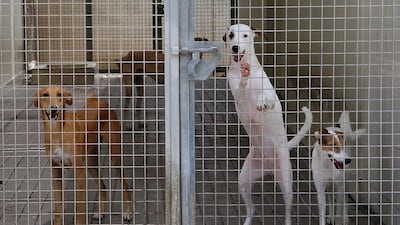Important questions to consider
1. Where on the plane does my pet travel?
There are different types of travel available for pets:
- Manifest cargo
- Excess luggage in the hold
- Excess luggage in the cabin
Each option is safe. The feasibility of each option is based on the size and breed of your pet, the airline they are traveling on and country they are travelling to.
2. What is the difference between my pet traveling as manifest cargo or as excess luggage?
If traveling as manifest cargo, your pet is traveling in the front hold of the plane and can travel with or without you being on the same plane. The cost of your pets travel is based on volumetric weight, in other words, the size of their travel crate.
If traveling as excess luggage, your pet will be in the rear hold of the plane and must be traveling under the ticket of a human passenger. The cost of your pets travel is based on the actual (combined) weight of your pet in their crate.
3. What happens when my pet arrives in the country they are traveling to?
As soon as the flight arrives, your pet will be taken from the plane straight to the airport terminal.
If your pet is traveling as excess luggage, they will taken to the oversized luggage area in the arrival hall. Once you clear passport control, you will be able to collect them at the same time as your normal luggage. As you exit the airport via the ‘something to declare’ customs channel you will be asked to present your pets travel paperwork to the customs official and / or the vet on duty.
If your pet is traveling as manifest cargo, they will be taken to the Animal Reception Centre. There, their documentation will be reviewed by the staff of the ARC to ensure all is in order. At the same time, relevant customs formalities will be completed by staff based at the arriving airport.
4. How long does the travel paperwork and other travel preparations take?
This depends entirely on the location that your pet is traveling to. Your pet relocation compnay will provide you with an accurate timeline of how long the relevant preparations will take and at what point in the process the various steps must be taken.
In some cases they can get your pet ‘travel ready’ in a few days. In others it can be up to six months or more.
5. What vaccinations does my pet need to travel?
Regardless of where your pet is traveling, they will need certain vaccinations. The exact vaccinations they need are entirely dependent on the location they are traveling to. The one vaccination that is mandatory for every country your pet may travel to is a rabies vaccination.
Other vaccinations may also be necessary. These will be advised to you as relevant. In every situation, it is essential to keep your vaccinations current and to not miss a due date, even by one day. To do so could severely hinder your pets travel plans.
Source: Pawsome Pets UAE
If you are leaving the UAE with a furry, four-legged family member, planning their relocation requires a little more than simply booking a plane ticket.
Whether it is a cat or a dog, there is a checklist to consider when looking to relocate your pet.
There are different types of travel available for pets, including manifest cargo, excess luggage in the hold and excess luggage in the cabin.
When a pet travels as manifest cargo, it is booked on its own ticket and can arrive before or after you.
All options are safe and the feasibility of each is dependent on the breed, arrival destination, size of the animal and airline.
Checking your pet into a flight as accompanied or excess baggage is generally cheaper and your pet gets to travel on the same flight.
However, costs and travel plans vary, and there is no one-size-fits all approach to moving your pet overseas.
Kirsty Kavanagh, founder of Pawsome Pets UAE, a relocation agency, said prices can vary from Dh2,000 to Dh30,000 for dogs, but there are some “basic fundamentals that apply across the board”.
Vaccinations should be up to date. The type and timing of vaccinations before travel depends on the destination, but the rabies shot is mandatory for every country.
Here, The National has put together a basic checklist of things to consider when relocating your pet from the UAE.
Documents for exporting pets from the UAE?
This depends on the country you are travelling to, so make sure you check the government website of the arrival destination.
You will need a valid rabies certificate, and in most cases a travel-certified carrier, an export permit and proof that the animal is microchipped. Your vet or pet relocation company will be able to help with advice and paperwork.
The animal should be at least 12 weeks old to be vaccinated for the first time and 15 weeks to be exported. For some countries, the pet should be 27 weeks old at the time of relocation.
Other documents you will need:
- Copy of owner's passport
- Original vaccination card or animal passport. This must include the microchip number, and full description of the animal including type, colour, gender, date of birth and any other distinctive signs
- A statement from a certified vet that the animal has fulfilled all the required vaccinations including name of the vaccine, manufacturer, batch number and date of vaccination
- Any treatments or medication the animal is on
- Valid original official health certificate from a vet within five days from travel date and the original certificate for Rabies Serum Neutralisation test
Get an export permit from the ministry
You need to secure a health certificate and pet export permit from the Ministry of Climate Change and Environment (MOCCAE). This service costs about Dh400.
Your permit should be valid for at least 30 days from its date of issue. To apply for the pet health certificate in the UAE, you need to:
- Log on and create an account on the MOCCAE portal
- Fill out the e-form
- Make the payment
- Get your pet tested or physically examined (if required)
- Obtain the electronic health certificate
No microchip, no travel
While there are some countries that do not require a microchip for import of a pet, it is mandatory for all UAE pet exports, so this is one of the first things to consider when planning your relocation.
Your vet can assist you with microchipping your pet and it is important to ensure it is an ISO 11784 / 11785 compliant 15-digit pet microchip.
Once it is complete, have your vet write the date the microchip was inserted in your pet’s vaccination book. At the time your pet travels, you will be asked to confirm that the microchip was in place prior to the most recent rabies vaccine.
Be clear about the breed of your pet
Have the breed written clearly in the vaccination book. If it is a mixed breed, it is important you have a correct understanding of the mixes. If you guess or make the listing vague, it can create problems at customs.
Up-to-date vaccinations
Always keep your pet’s full set of vaccinations up to date. Missing a booster by a few days can result in starting a full course of new vaccinations from scratch and that can delay a pet’s relocation for months.
Research the import steps for country of arrival
It is imperative that you stay on top of the mandatory processes and timelines of the country that you are relocating your pet to. Some countries such as Australia require a six month timeline for various tests and treatments in advance of travel. Being aware of the requirement and knowing you need to take steps sooner rather than later, are a big bonus.
Work out the relocation cost in advance
Prices vary from country to country and change depending on breed and weight. Ask an experienced relocator to give you an indicative cost for moving your pet to your country of choice.
Remember that costs and processes are subject to change. For instance, snub-nosed dogs, such as pugs, cannot fly during the summer.
In the past, Ms Kavanagh said flying a small Chihuahua to the UK cost Dh7,000 to Dh8,000, while for a German Shepherd it was Dh16,000 to Dh17,000.
Measure your pet for its travel crate
You must ensure that you have a travelling crate that complies with the International Air Transport Association requirements.
You should measure your pet whilst it is in a standing position. The length, height and width of your pet are required.
- Measure length from the nose to base of tail/bottom
- Measure height from the floor to the top of the head, or if ears are erect, to the tip of the ear
- Measure width at the widest part of the body
- Measure length of the foreleg, floor to elbow
Pet abandonment is punishable by law in the UAE
Important questions to consider
1. Where on the plane does my pet travel?
There are different types of travel available for pets:
- Manifest cargo
- Excess luggage in the hold
- Excess luggage in the cabin
Each option is safe. The feasibility of each option is based on the size and breed of your pet, the airline they are traveling on and country they are travelling to.
2. What is the difference between my pet traveling as manifest cargo or as excess luggage?
If traveling as manifest cargo, your pet is traveling in the front hold of the plane and can travel with or without you being on the same plane. The cost of your pets travel is based on volumetric weight, in other words, the size of their travel crate.
If traveling as excess luggage, your pet will be in the rear hold of the plane and must be traveling under the ticket of a human passenger. The cost of your pets travel is based on the actual (combined) weight of your pet in their crate.
3. What happens when my pet arrives in the country they are traveling to?
As soon as the flight arrives, your pet will be taken from the plane straight to the airport terminal.
If your pet is traveling as excess luggage, they will taken to the oversized luggage area in the arrival hall. Once you clear passport control, you will be able to collect them at the same time as your normal luggage. As you exit the airport via the ‘something to declare’ customs channel you will be asked to present your pets travel paperwork to the customs official and / or the vet on duty.
If your pet is traveling as manifest cargo, they will be taken to the Animal Reception Centre. There, their documentation will be reviewed by the staff of the ARC to ensure all is in order. At the same time, relevant customs formalities will be completed by staff based at the arriving airport.
4. How long does the travel paperwork and other travel preparations take?
This depends entirely on the location that your pet is traveling to. Your pet relocation compnay will provide you with an accurate timeline of how long the relevant preparations will take and at what point in the process the various steps must be taken.
In some cases they can get your pet ‘travel ready’ in a few days. In others it can be up to six months or more.
5. What vaccinations does my pet need to travel?
Regardless of where your pet is traveling, they will need certain vaccinations. The exact vaccinations they need are entirely dependent on the location they are traveling to. The one vaccination that is mandatory for every country your pet may travel to is a rabies vaccination.
Other vaccinations may also be necessary. These will be advised to you as relevant. In every situation, it is essential to keep your vaccinations current and to not miss a due date, even by one day. To do so could severely hinder your pets travel plans.
Source: Pawsome Pets UAE

















